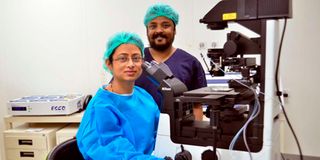Fertility Point Kenya gives hope to Bungoma residents

Dr Rajesh Chaudhary, a reproductive endocrinologist, with his wife, Dr Manju Chaudhary, a senior embryologist, at the clinic’s IVF Lab on July 29, 2021.
Fertility Point Kenya (FPK) – a world class fertility centre committed to helping patients struggling with fertility challenges, is holding a free medical camp at Lifecare Hospitals in Bungoma
During the two-day event that runs from Friday to Saturday, Fertility Point’s team of fertility experts will give medical assistance to people struggling with infertility.
“Having a child of their own is every couple’s dream. However, today, for various reasons, conceiving a baby naturally has become difficult for many couples. Fertility investigation and treatment can help couples conceive a baby naturally of with the help of medical intervention and advanced Assisted Reproductive Techniques (ART). Thus, we are here to help couples who are struggling with infertility from western Kenya achieve their dreams of parenthood,” said Dr. Faith Muchira, Resident Medical Officer at Fertility Point Kenya during the camp.
As part of the free medical camp, any patient who visits the clinic’s tent will have a chance of getting a free consultation on any fertility-related concern, interact with FPK’s fertility experts, understand the available treatment options for infertility and ultimately get help. They will also be gifted with special hampers from the clinic.
The ongoing free fertility medical camp has been hailed by Bungoma residents as timely.
“My husband and I had been trying to get pregnant for three years with no luck. But after seeing this provider, we are hopeful that our condition has been addressed and we will be blessed to have a baby,” said Ms Nekesa Nalianya, a resident of Bungoma.
Dr. Philip Gacheru, director of operations at Fertility Point Kenya advised patients who are struggling with infertility to seek help sooner because age is a key factor in successful treatment.
“You should seek help sooner [after six months of trying] if you're older than 35 and as early as possible if you are around 40 years old. A woman's chances of getting pregnant decrease with age. A 30-year-old woman is half as fertile as a 20-year-old woman,” Dr Gacheru.
Advancement in medicine has made it possible to give hope even to infertile couples.
“It is best to identify symptoms at the earliest and begin treatment right away to increase your chances of having a baby. Fertility Point Kenya offer these treatments, so be sure to choose wisely,” he advised.





